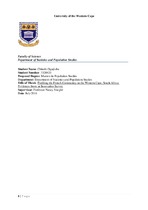| dc.description.abstract | In South Africa, demographics consequently play a prominent role in public policy and the country (rainbow nation) or often called a World in One Country, provide interesting interactions between the whites, coloured and blacks. South Africa remains the highest-ranked country in sub-Saharan Africa and the second-placed among the BRICS economies. Furthermore, the country benefits from the large size of its economy, particularly by regional standards, but the profile of various immigrant groups is poorly understood, thereby creating ambivalence in policy frameworks. A, major weakness of research in this area has been the tendency to study causes and impacts of migration separately, which constitute largely separate strands of migration literature. More in general, the scholarly debate has tended to separate the determinants and impacts of migration artificially from more general processes of socioeconomic contexts. Thus, there is a clear need to study migrant profiles in their wider societal context, which makes this study contemporaneous. Our research profiles both the demographics and socioeconomic dynamics of the French immigrants in South Africa on one hand and highlights the differences between French emigrants in Western Cape, South Africa and their counterparts residing in France vis-à-vis South Africans in Western Cape. In determining, the effect of socioeconomic and demographic profiles of the French immigrants in the Western Cape, a Google web design was used. Prior to this, a pilot study using samples of French and Anglophones persons was done to validate the instrument. Two questionnaires were used for the study; one in English and the other in French. Likert scales, multiple choice, open ended and close ended questions were contained in our instrument. Only registered households with French Consulate were included in the population sample. The population of South Africans is much younger than that of the French in Western Cape or French in France. The latter group is ageing but lives longer than the South Africans because of advancement in health infrastructure. Thus, the French community in the Western Cape are better placed economically, socially, and health-wise compared to the South Africans (WC) and the French in France. However, in few areas like education, rent and medical insurance coverage, the French in France are better placed than the French and South Africans in the Western Cape, because of structural issues peculiar in a country like South Africa. These social issues in France have more optimality than in South Africa. Our results further confirm the validity of the New Economics of Labour Migration Theory, which recognises the role of households as against individuals in jointly making the decision to migrate. Migration of a household member is a way to spread the risk of insufficient household income. Nonetheless, the survey indicates that the Western Cape is a city of choice for French migrants. However, a comparative analysis of the influx of the French to other regions would further show the real reasons for French deciding to pitch tent in a particular region. Analysis suggests an imbalance in the labour supply of the French immigrants which could be a structural phenomenon akin to also to the South Africans themselves. Enlightenment programmes for the target population and host population could help in this regard to balance the labour mix. There is no doubt that the socioeconomic impact of migration has been intensively studied by scholars, but it is still often driven by ill-informed opinions, which, in turn, can lead to public resentment towards migration. This is exactly the case for South Africa that has witnessed rounds of xenophobic attacks on migrants. These negative assessments risk on-going efforts to adapt migration policies to the new economic and demographic challenges facing many countries. Results confirm that labour supply becomes the pull factor for the French immigrants. Furthermore, it is likely that the bureaucratic set up at the Home Affairs is still inhibiting the French Immigrants from processing their documentation. On the average, it takes about 2 to 3 years to process legal permit documents for foreigners in South Africa. This process could be discouraging others from migrating to South Africa. Also, the xenophobic syndrome and inconsistent policy framework could also be a deterrent to foreigners who genuinely want to reside on a permanent basis in the country. The development potential of migrants is not expressed to its fullest extent, partly because of the lack of migration-supporting policies, which pushes many migrants to illegality despite the demand for their labour in certain sectors. Being undocumented not only encourages exploitation in the workplace but also prevents migrants from contributing to the development of the host country by paying taxes. A step in the right direction would be to encourage government service providers to mainstream migration into policies and programmes. This would set the framework for greater respect for migrants' rights, as well as facilitate the integration of migrants and acknowledge their contribution to the development of host and home countries. | en_US |

